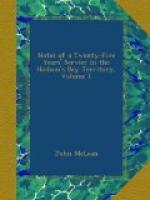With unmarried women there is no risk, as they are entirely free from control; not so with the married, who are under strict surveillance; but the husband’s consent asked and obtained—which not seldom happens—saves the gallant’s head, and the lady’s reputation.
Their courtships are conducted in much the same manner as among the inland Indians, the choice of partners being entirely left to the parents. Some are affianced in childhood, and become man and wife in early youth: I have seen a boy of fourteen living with his wife who was two years younger. There are no marriage festivals, and no ceremonies of any kind are observed at their nuptials. Polygamy is allowed, ad libitum; and the husband exercises his authority as husband, judge, or executioner; no one having any right to interfere. Should, however, the woman consider herself ill-treated, she flees to her parents, with whom she remains till an explanation takes place. If it lead to a reconciliation, the parties are reunited; if not, the woman may form a new connexion whenever she pleases.
I know not whether the Esquimaux can be said to have any idea of religion, as the term is generally understood. The earth, say they, was in the beginning covered with water, which having subsided, man appeared—a spontaneous creation. Aglooktook is the name of the man who first created fish and animals: chopping a tree which overhung the sea, the chips that fell into that element became fish; those that fell on the land, animals. Their paradise is beneath the great deep; those who have lived a good life, proceed to a part of the sea abounding with whales and seals, where, free from care and toil, they fare sumptuously on raw flesh and blubber, in secula seculorum. The wicked, on the contrary, are condemned to take up their abode in a “sea of troubles,” where none of the delicacies enjoyed by the blessed are to be found; and even the commonest necessaries are procured with endless toil, and pain, and disappointment. Although the “tomakhs,” or dead men, become the inhabitants of the sea, they indulge in the pleasures of the chase on their old element, whenever they please; and are often heard calling to each other while in pursuit of the deer.
The Esquimaux have their “men of medicine,” in whose preternatural powers they place the most implicit confidence; by working on the superstitious fears of the people, these impostors obtain much authority. They are allowed to take the lead in every affair of importance; and, in short, all their movements are, in a great measure, regulated by these harlequins, who appear to be the only chiefs among them.
They dispose of their dead by placing them on the rocks, and covering them over with ice or stones; these tombs prove but feeble barriers against the wolves and other beasts of prey, who soon carry off the bodies. The property belonging to the deceased is placed by the side of his grave;—his caiak, or skin canoe, his bows, arrows, and spears. Thus equipped, the emigrant spirit cannot find itself at a loss on arriving at a better country!




